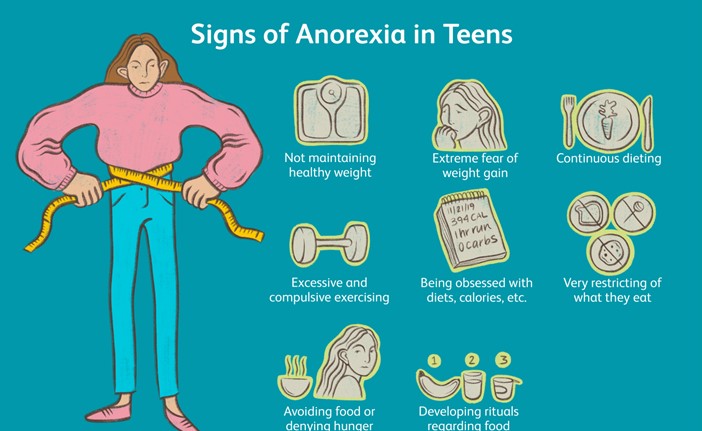A nurse is collecting data from an adolescent client who has anorexia nervosa. Which of the following findings should the nurse expect?
Hyperkalemia
Tachycardia
Constipation
Metrorrhagia
The Correct Answer is C
Constipation. Constipation is a common symptom of anorexia nervosa, as it can result from severe food restriction, dehydration, electrolyte imbalance, or laxative abuse. People with anorexia may also experience abdominal pain and bloating due to constipation.

Choice A. Hyperkalemia. Hyperkalemia is a condition of high potassium levels in the blood. It is not a typical symptom of anorexia, as people with anorexia tend to have low potassium levels due to vomiting, diuretic use, or inadequate intake.
Hyperkalemia can cause irregular heart rhythms, muscle weakness, and paralysis.
Choice B. Tachycardia. Tachycardia is a condition of fast heart rate. It is not a common symptom of anorexia, as people with anorexia tend to have bradycardia, which is a slow heart rate. Bradycardia can result from starvation, dehydration, or electrolyte imbalance and can lead to cardiac arrest. Tachycardia can occur in some cases of anorexia due to dehydration, anxiety or refeeding syndrome.
Choice D. Metrorrhagia. Metrorrhagia is a condition of irregular or excessive bleeding between menstrual periods. It is not a usual symptom of anorexia, as people with anorexia tend to have amenorrhea, which is the absence of
Nursing Test Bank
Naxlex Comprehensive Predictor Exams
Related Questions
Correct Answer is B
Explanation
Answer: B. 6-year-old child who has a spiral fracture of the tibia and fibula, which reportedly occurred while riding a bicycle.
Rationale:
A) 3-year-old toddler with scalding burns over the face and chest reportedly sustained when the child pulled on a tablecloth, spilling a cup of tea on himself:
Scalding burns in young children can be accidental, especially if the burns are consistent with typical patterns seen in such accidents. However, burns covering a large area, especially on the face and chest, may warrant further investigation to rule out abuse, particularly if the explanation seems inconsistent with the injury.
B) 6-year-old child who has a spiral fracture of the tibia and fibula, which reportedly occurred while riding a bicycle:
A spiral fracture is often associated with a twisting or rotational force, which is less common in typical bicycle accidents. Spiral fractures in children can be indicative of physical abuse, particularly if the explanation for the injury does not fit the typical mechanisms of injury associated with the reported activity. This type of fracture should prompt a thorough evaluation for possible abuse.
C) 14-month-old toddler who is reportedly learning to walk and has several bruises on bony prominences of the lower legs and elbows:
Bruises on bony prominences are common in toddlers who are learning to walk and are prone to minor falls. This pattern of bruising is usually consistent with typical developmental activities rather than abuse. However, repeated or severe bruising should still be evaluated carefully.
D) 9-month-old infant who sustained near drowning when he reportedly climbed into the tub and turned on the water:
While near drowning in an infant is a serious concern, it is less likely to be related to physical abuse if the explanation involves an accidental event. A thorough assessment is necessary to ensure safety and prevent further incidents, but the described scenario is not as indicative of abuse as a spiral fracture.
Correct Answer is D
Explanation
"I know you will do well living out in the community.". When a client expresses feelings of gratitude towards a nurse as they are about to be discharged, they are mostly affirming the therapeutic relationship between both parties. The nurse should acknowledge this affirmation clearly, warmly, and humbly, while encouraging the client's progress and independence. Choice D, "I know you will do well living out in the community" acknowledges the client's progress and offers encouragement.
Choice A, "Aren't you excited about being discharged today?" is a closed question that does not encourage the client's progress.
Choice B, "How do you feel about being discharged?" is not the best response because it is too broad.
Choice C, "I will send you a note in a few weeks" does not offer affirmation and encouragement to the client.
Whether you are a student looking to ace your exams or a practicing nurse seeking to enhance your expertise , our nursing education contents will empower you with the confidence and competence to make a difference in the lives of patients and become a respected leader in the healthcare field.
Visit Naxlex, invest in your future and unlock endless possibilities with our unparalleled nursing education contents today
Report Wrong Answer on the Current Question
Do you disagree with the answer? If yes, what is your expected answer? Explain.
Kindly be descriptive with the issue you are facing.
